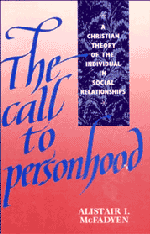7 - Theology, Church and politics
Published online by Cambridge University Press: 03 May 2011
Summary
A crucial strand in my argument is the understanding that a person is a structure of communication sedimented from a history of relations which take place within an overarching communication context. The specific nature of this wider network of relations, a determinate social world, will therefore be significant for the determination of relations and of the individuals who live within its frame. This social determinacy involves the very broadest connotations of the word ‘social’, including such things as social mores, tradition, language, culture and kinship groupings as well as political institutions. The wider social context provides rules for the social regulation of communication. My purpose throughout Part IV is to try to discern the socio-political practice and organisation which is required by the theory of the person developed thus far.
Before addressing this central theme, however, I will very briefly outline the way in which individuals are socio-politically determinate. I think this might be helpful because there is a deep-rooted suspicion in Western thought (a heritage of individualism, personalism and liberalism) that private rights, interests and freedoms are in principle opposed to their limitation in socio-political order. Socio-political structures, in that view, may be a necessary evil, but they cannot contribute anything essential to the individual. Individuals are not therefore considered to be determined in any sense by the socio-political structures within which they live. On the contrary, these structures are thought to be determined by the activity of asocial individuals.
- Type
- Chapter
- Information
- The Call to PersonhoodA Christian Theory of the Individual in Social Relationships, pp. 193 - 205Publisher: Cambridge University PressPrint publication year: 1990

